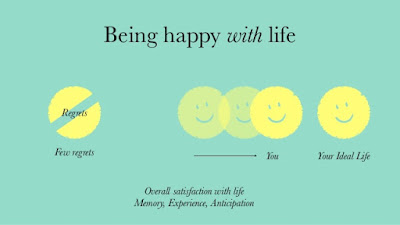Happiness is the generally defined state of contentment, delight and euphoria
Although a very widely used term, happiness is a very vague metric of measuring whether an individual feels contented with his/her life or not. I may have money and still not be very happy; I maybe broke tomorrow and still be the happiest person in the world.
 |
| Dark humour 101. |
 |
| I could've gone for one with Zoey (Anna Faris); but I couldn't. |
Since happiness cannot be quantified, lack of metrics disables its inclusion in the 4 types of utility: time, form, place, possession.
Although, scientific measurements can find some way to quantify even a subjective concept such as happiness; except the degree of subjectivity in case of happiness is just off the charts. 24*7 electricity for an Indian definitely offers a great degree of comfort to, however, that's not the case with a someone in Europe or US as it's just a fundamental, trivial commodity for them. |
| When even the "X-Team" leader's confused. |
So, the context across international borders continues to change, thereby making quantification of a subjective concept such as this very complicated and difficult to be all-inclusive
 |
| Nepalese PM Oli should really think about it. |
While a narrower domain, Behavioral Economics tries to evaluate happiness through indices such as HDI and per capita GDP, all of these are derivatives too and not fundamentally meant to evaluate individual happiness.
 |
| Nationalist sentiments kept aside; the concenpt of HDI was given by Mahbub ul Haq, a Pakistani economist. |
Despite of the psychology foundation of Behavioral Economics, it also has a rather arrested approach toward happiness.
This is probably because of the fundamental method of evaluation it promotes.
The evaluation of happiness is done by determining a country's employment, enrollment, life expectancy, etc. numbers (and not just be limited to GDP), however, given how government agency numbers are subject to institutional failures such as malpractices, lack of expertise, and sampling issues;
the inaccuracy and inherent loopholes invariably defeat the purpose.
 |
| Loopholes 101. |
Although, at some point , even developed nations no longer need to worry about GDP, Bhutan is the only country to have used "happiness" as their primary criteria for their residents welfare, Gross National Happiness (GNH)
Bhutan is reported to be the one and only country in the world to have completely dismissed GDP as a metric for measuring their nation's welfare. Instead, they've what's called "Gross National Happiness".
 |
| heads up, it's the King. |
From a development stand point, happiness is important as it is the true reflection of the actual living state of any individual, given different socio-eco-political factors that vary by countries.
 |
| India |
 |
| UAE |
 |
| South Korea |
With the above kept in perspective,
With that kept in perspective
This is Mayul
Signing off.
P.s Stay hydrated
(:
Socials:
Instagram: https://www.instagram.com/mayulmanav/
LinkedIn: https://www.linkedin.com/in/mayulmanav
My other works: https://linktr.ee/mayulmanav
Portfolio Website: https://www.mannerwriting.com/
Email for content writing services: mannerwriting@gmail.com
.
.
.
References:
nothing much, just google images, really. :P
·






Comments
Post a Comment